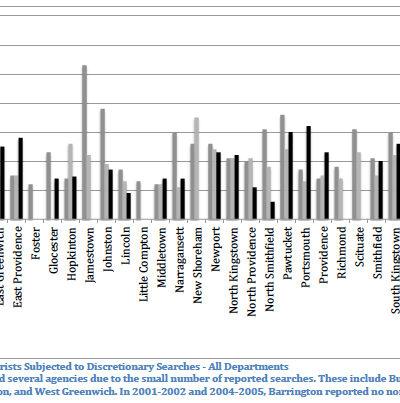News & Commentary
Apr 06, 2015
ACLU President To Visit RI To Discuss Urban Policing
President of the American Civil Liberties Union Susan Herman will be in Rhode Island Wednesday to discuss urban policing with local officials and experts.

Feb 19, 2015
ACLU Report Highlights Racial Disparities In School-To-Prison Pipeline
The American Civil Liberties Union of Rhode Island today issued a report calling on state and municipal leaders to examine policies, practices and procedures that lead to discriminatory treatment of black Rhode Islanders, from elementary school through adulthood. The ACLU report, titled “The School-to-Prison Pipeline in Black and White,” offers a brief but systematic examination of racial disparities in Rhode Island, and how those interconnected disparities can lead to a lifetime of unequal treatment. The report, presented in a series of twelve charts, comes as the nation celebrates Black History Month, and grapples with recent events that have pushed racial disparity issues back into the forefront.

Jan 23, 2015
ACLU Reveals Extensive Providence Police Surveillance of Peaceful Protests; No Guidelines In Place
The American Civil Liberties Union of Rhode Island expressed alarm today that, without any regulations governing the practice, the Providence Police Department has been videotaping peaceful demonstrations the past two years. Even more disturbingly, the videotaping has often focused on other people, including journalists, who are recording the events, rather than trying to document illegal activity, suggesting that the real purpose of the recordings is to intimidate protesters engaging in First Amendment-protected activity.

Dec 15, 2014
Data Shows Racial Profiling Increasing In Searches During Motor Vehicle Stops
As part of an ongoing analysis of racial disparities in Rhode Island, the ACLU of Rhode Island today announced that racial disparities in searches during motor vehicle stops appear to be increasing.

Nov 25, 2014
ACLU Of Rhode Island Statement On Events in Ferguson, Missouri
The ACLU of Rhode Island has issued the following statement in response to recent events in Ferguson, Missouri: “Recent events in Ferguson, Missouri highlight the vast gap that often exists between the police and communities of color. Certain policing practices can unnecessarily antagonize communities by casting a blanket of suspicion over entire neighborhoods. These practices are responsible, at least in part, for the vast racial disparities we see in our criminal justice system. The discussion generated by Michael Brown's death must lead to constructive resolutions. In that regard, the ACLU of Rhode Island will continue to work to promote transparency and accountability in police conduct, to roll back the militarization of local police departments, and to end racial profiling in the state."

Nov 19, 2014
Rhode Island Arrest Data Shows Larger Racial Disparity Than In Ferguson, Missouri
Many police departments across Rhode Island disproportionately arrest black individuals at rates that eclipse the racial disparity of arrests found in Ferguson, Missouri, newly reported data shows.

Nov 12, 2014
ACLU Files Suit Over Medical Marijuana Discrimination
The ACLU of Rhode Island has filed a lawsuit on behalf of a URI graduate student who was denied summer employment this year at a fabrics company because of her status as a registered medical marijuana user.

Oct 15, 2014
ACLU Statement In Response To "Rhode Island Traffic Stop Statistics Data Collection Study"
ACLU of Rhode Island executive director Steven Brown released the following the statement on the Rhode Island Traffic Stop Statistics Data Collection Study. The report includes data for all local police departments and State Police. It is available here.

Stay Informed
Sign up to be the first to hear about how to take action.
By completing this form, I agree to receive occasional emails per the terms of the ACLU’s privacy statement.
By completing this form, I agree to receive occasional emails per the terms of the ACLU’s privacy statement.
